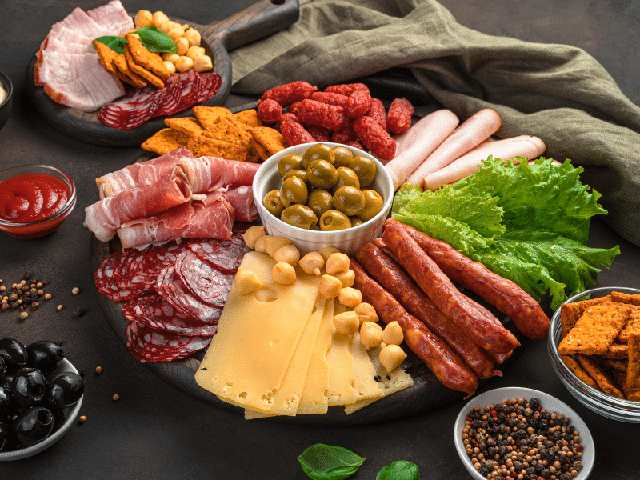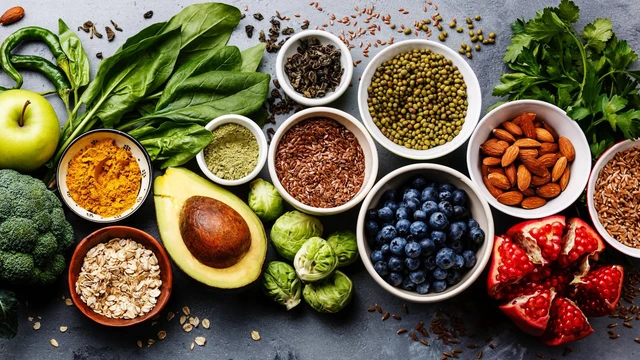In addition to complying with colon cancer treatment, nutrition plays an important role, directly affecting the health, treatment process and recovery ability of the patient.
1. The importance of diet for people with colon cancer
Colon cancer is a tumor that appears in the large intestine and can develop locally, invade surrounding organs or metastasize to other distant organs.
Scientists have researched and found that groups of people susceptible to colon cancer include: Genetic factors; people over 50 years old; people with chronic ulcerative colitis; people with colon polyps…
In particular, unhealthy lifestyles and unreasonable diets such as: Obesity , overweight; Eating few fruits and vegetables; Eating little fiber and lots of fat; Eating a lot of red meat; Drinking alcohol, smoking… are also causes that increase the risk of colon cancer.
Health experts also say that an unhealthy diet can cause systemic inflammation and insulin resistance and easily change the intestinal microflora, thereby increasing the risk of cancer, including colon cancer.

A diet high in processed meat increases the risk of colon cancer.
Early diagnosis of colon cancer is crucial to the success of treatment. When diagnosed with colon cancer, in addition to complying with treatment, diet plays an important role, directly affecting the health, treatment process and recovery ability of the patient.
If colon cancer is detected at an early stage, the success rate of treatment can be up to more than 90%. In addition, to prevent colon cancer, we need to change to a more scientific lifestyle by: Regular exercise. Eat healthy, add lots of green vegetables, fiber, and fruits to the daily menu. At the same time, limit greasy foods, spicy foods, pickled foods, foods with lots of spices, processed foods, etc.
According to the American Cancer Society, although there is no clear evidence that a specific diet can help reduce the risk of colon cancer recurrence, some studies show that colorectal cancer survivors who eat a diet rich in vegetables, fruits, whole grains, chicken and fish may live longer than those who eat a diet high in refined sugar, fat, red meat or processed meat.
2. Essential nutrients for colon cancer patients
Providing adequate nutrients
Providing adequate nutrients will help cancer patients have enough energy to fight the disease and recover after surgery, radiation therapy or chemotherapy. Eating enough nutrients also helps strengthen the immune system; reducing the risk of vitamin and mineral deficiencies, factors that can weaken health and make the disease worse.
To meet nutritional needs during cancer treatment, the American Society of Clinical Oncology recommends that cancer patients ensure adequate provision of essential nutrients including: protein, carbohydrates, fats, vitamins, minerals and water.
Protein
Protein provides energy and helps the body recover. Good and easily absorbed protein-rich food sources include: Lean meat, chicken breast, fish, eggs, yogurt, beans, etc.
Fiber and Antioxidants
Research shows that plant-based foods that are high in fiber and antioxidants can protect and repair damaged DNA in the body.
Antioxidants help protect the body and neutralize free radicals that damage cells, which can reduce the risk of cells mutating due to damage and becoming cancerous.
Many vitamins and minerals in vegetables, fruits, whole grains, and beans also help produce and repair DNA and control cell growth. Some foods have a direct impact on cancers, specifically plant foods that are high in fiber, which can reduce the risk of colorectal cancer.
A study published in the Journal of the American Medical Association (JAMA) found evidence that increasing fiber intake after a colon cancer diagnosis offers patients benefits including improved survival rates. Researchers found that for every 5g of fiber someone ate each day, they had a 22% lower risk of dying from colorectal cancer and a 14% lower risk of dying from all causes.
Healthy fats
Fat is important because it provides energy, maintains cell growth, stabilizes blood pressure, and helps the body absorb nutrients.
Good sources of fat for people with colon cancer include: Olive oil, avocado, nuts (almonds, walnuts, chia seeds, etc.); Fatty fish (salmon, mackerel, tuna, etc.).
Vitamins and minerals
Supplementing vitamins and minerals through diet helps people with colon cancer strengthen their immune system, fight infections, and support the treatment process. Some foods help increase the effectiveness of cancer treatments such as vitamins C, E, D, calcium, zinc, beta-carotene and selenium…
Food sources rich in vitamins and minerals that are good for people with colon cancer include: Vegetables and fruits containing many different vitamins and minerals; Milk and dairy products provide calcium, vitamin D and protein; Lean meat provides zinc, iron, vitamin B12.
Note: To reduce unpleasant symptoms in eating during cancer treatment, patients should divide meals into many small meals a day to ensure that the total amount of food provides enough calories the body needs. Drink enough water every day. If water is not tasty, add more liquid to other foods and drinks such as soup, tea, milk, fruit juice…

Foods rich in fiber and antioxidants are good for people with colon cancer.
3. Foods that are not good for people with colon cancer
Foods high in saturated fat and trans fat
- Red meats.
- Processed foods: sausages, bacon, sausages…
- Fast foods: grilled meat, fried chicken, french fries, hamburgers…
- Butter, cream, cheese…
Foods high in sugar
- Soda, carbonated soft drinks.
- Cake, candy, jam, ice cream.
- Canned fruit juice.
Foods that cause gas and are difficult to digest
- Soybeans.
- Cabbage.
- Bamboo shoots.
- Animal organs.
Alcohol, beer, cigarettes
According to the American Cancer Society, it is unclear whether alcohol affects the risk of colorectal cancer recurrence, but drinking alcohol is associated with an increased risk of colorectal cancer, especially in men. Therefore, it is best for patients not to drink alcohol.
Research also shows that colorectal cancer survivors who smoke are more likely to die from cancer (as well as from other causes). Barring any impact on colorectal cancer risk, quitting smoking has many other health benefits.





